Wondering about the pivotal role of deacons in the early Church? Discover how they shaped community and worship in Acts 6.
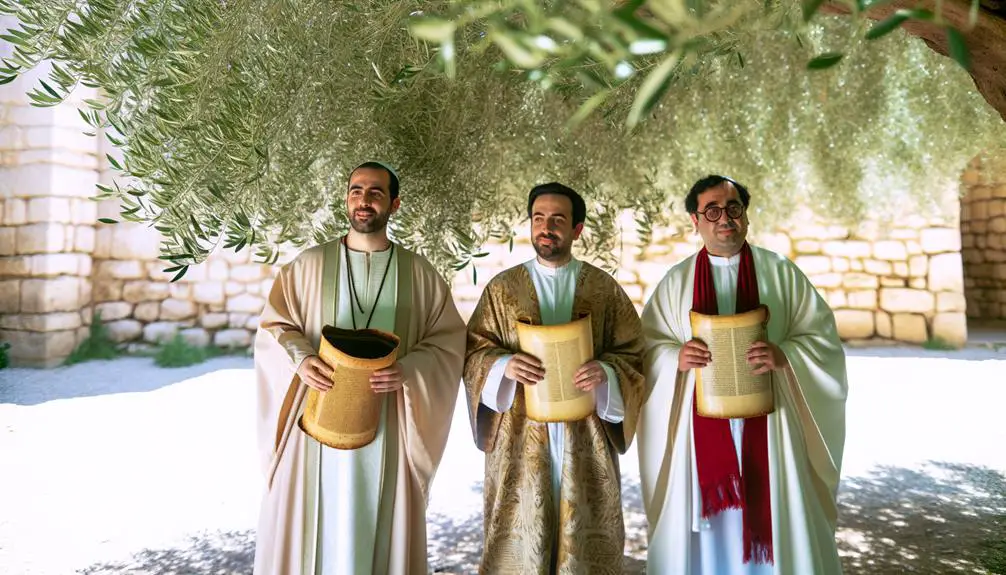
Deacons in the Bible
In the Bible, deacons are established in Acts 6, where you'll find their foundational role in managing the practical necessities of the early Church. They were carefully selected based on stringent spiritual and moral qualifications, including wisdom and the fullness of the Holy Spirit, as noted in Acts 6:3. Their duties stretched from assisting in worship to handling finances and aiding the needy, embodying a model of servant-leadership that was quite remarkable at the time. Figures like Stephen and Philip exemplify the profound impact deacons had on church growth and community outreach, engaging effectively across diverse social contexts. Explore further to uncover the depth of their dynamic roles.
Key Takeaways
- Deacons first appear in Acts 6:1-6, chosen to address practical church needs.
- Key qualifications include being full of the Spirit and wisdom (Acts 6:3).
- Prominent biblical deacons like Stephen and Philip were pivotal in early Church outreach.
- The role includes serving the needy, assisting in worship, and managing church finances.
- Deacons embody servant-leadership, pivotal in church governance and community service.
Biblical Origins of Deacons
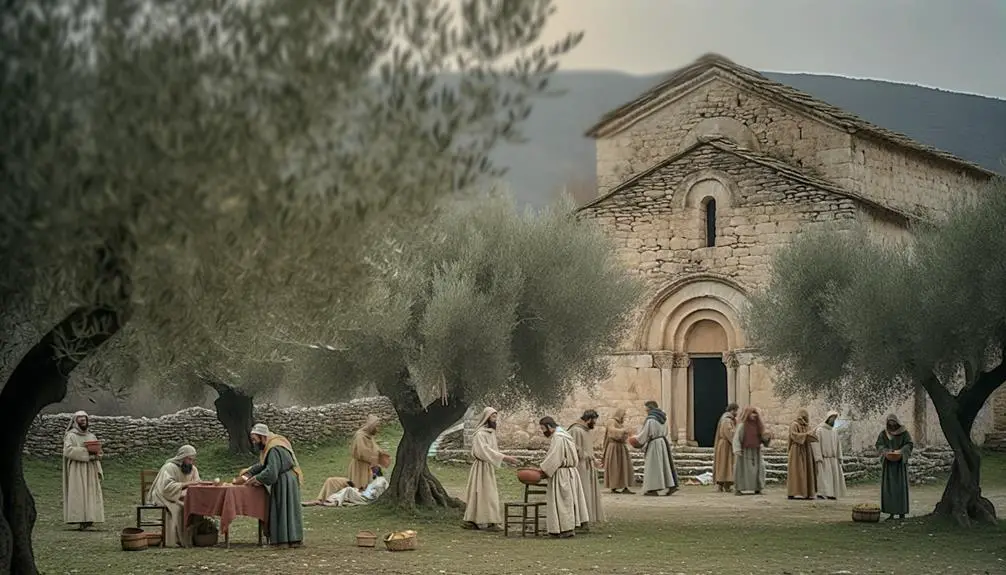
The role of deacons emerges distinctly in the New Covenant, specifically in the book of Acts, where they're appointed to address practical needs within the early Church. This development is not merely an administrative evolution but is deeply rooted in the historical context and cultural interpretations of early Christian communities. Analyzing Acts 6:1-6 offers insights into how these roles were shaped by both internal dynamics and external pressures faced by the nascent Church.
In this passage, the appointment of deacons is precipitated by a practical crisis: the distribution of food to widows. However, the solution isn't just logistical; it's profoundly theological. The choice of deacons, from a diverse cultural background, underscores the Church's commitment to unity and inclusivity, reflecting the cultural mosaic of early Christian followers. This inclusivity is a strategic response to the cultural and social heterogeneity that could have fragmented the early Church.
Moreover, the role of deacons was shaped by a broader cultural expectation of service and leadership within communities. In a society where leadership often correlated with social status, the early Church's model of servant-leadership presented a countercultural paradigm. This not only facilitated internal cohesion but also provided a distinct identity for Christians within the Greco-Roman world.
The Role and Duties
Deacons serve as the Church's hands and feet, tasked with operational and pastoral duties that support both the spiritual and material needs of the community. Essential to your role, deacon training equips you to navigate these responsibilities effectively. It involves thorough study of the Scriptures and the Church's doctrine to make sure you're well-prepared to handle spiritual responsibilities and offer pastoral care.
Your duties encompass a broad spectrum, including assisting during worship services, managing church finances, and overseeing the distribution of aid to those in need. You're not just performing tasks; you're fostering a vibrant community of faith. This role demands a delicate balance between administrative skills and spiritual sensitivity, a balance that's central to the effectiveness of your ministry.
Moreover, spiritual responsibilities are paramount. You are expected to lead by example, demonstrating a life of service, humility, and devotion. Your actions and decisions should inspire and encourage others in their faith journey. In fulfilling these duties, you play an important role in the life of the Church, bridging the gap between the congregation and the broader church leadership, making sure that the spiritual welfare of the community is attended to with diligence and care.
Qualifications for Deaconship
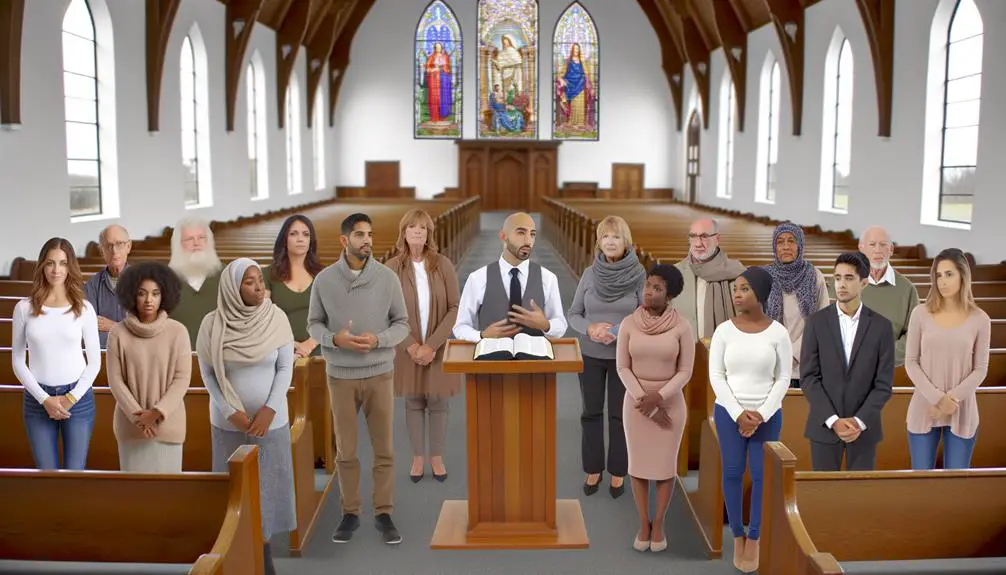
To qualify for deaconship, you must meet specific spiritual, moral, and practical criteria outlined in biblical teachings and church doctrine. The process of deacon selection isn't merely administrative; it calls for discerning individuals who exhibit profound spiritual maturity. This maturity is essential because deacons are not only servants but also exemplars of faith within the community.
Firstly, you're expected to be 'full of the Spirit and of wisdom' as stated in Acts 6:3. This implies a deep, personal connection with spiritual practices and an ability to apply biblical wisdom to real-world situations. Integrity plays a significant role; I Timothy 3:8-10 emphasizes that deacons must be dignified, not double-tongued, not addicted to much wine, not greedy for dishonest gain, and must hold the mystery of the faith with a clear conscience.
Furthermore, your ability to manage your household well is seen as a reflection of your capacity to serve the church community effectively (I Timothy 3:12). This criterion suggests that personal life management skills translate into public service capabilities.
Prominent Deacons in Scripture
Having outlined the qualifications for deaconship, let's now examine some significant deacons mentioned in the Bible who exemplify these criteria in their service. Stephen and Philip are two prominent figures whose roles as deacons demonstrate adherence to apostolic teachings and a profound commitment to their communities.
Stephen, often recognized for his martyrdom, was one of the first deacons appointed by the apostles to distribute food and aid to the widows in the early church, as described in Acts 6. His role went beyond mere administrative tasks; he was a powerful preacher, filled with the Holy Spirit. His dedication culminated in a profound defense of his faith before the Sanhedrin, wearing his deacon attire, symbolizing his official capacity and dedication to service. His speech, rich in scriptural references and wisdom, reflects his deep understanding of and adherence to apostolic teachings.
Philip, another exemplary deacon, ventured beyond traditional boundaries by preaching to non-Jews, illustrating the expansive reach deacon service was intended to have. Acts 8 details his evangelical missions, including the notable conversion of the Ethiopian eunuch, showcasing a deacon's role in spreading the Gospel and nurturing new believers in the faith. Their stories emphasize the dynamic and essential role of deacons in the early church.
Women as Deacons
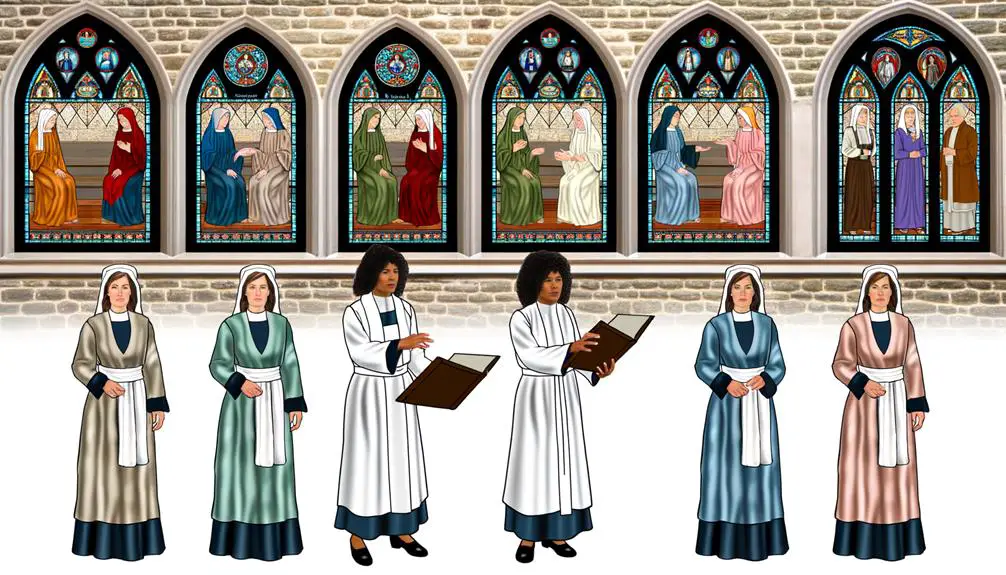
You'll find that the role of women as deacons in scripture is not only historical but also deeply theological. Examining biblical examples, such as Phoebe in Romans 16:1-2, reveals how early Christian communities recognized and valued female ministry. These scriptural precedents have profound implications for modern church practices, challenging contemporary views on gender roles within ecclesiastical hierarchies.
Biblical Examples: Female Deacons
Throughout the New Scripture, evidence suggests that women served as deacons, playing pivotal roles within the early Christian communities. The cultural context of the time often relegated women to subsidiary roles, yet the inclusion of female deacons highlights a challenging of traditional gender roles. This acknowledgement within the scriptures not only underscores their spiritual authority but also showcases the adaptability and inclusiveness of early Christian practices.
- Phoebe of Cenchreae: Referenced in Romans 16:1-2 as a deacon and a benefactor.
- Priscilla: Often coupled with her husband Aquila in the ministry.
- Mary and Martha: Their active roles suggest a form of leadership.
- Tabitha: Acts 9:36 describes her as abounding in good works and acts of charity.
- Euodia and Syntyche: Mentioned in Philippians for their labor in the gospel.
Theological Implications
Reflecting on the roles of female deacons in early Christian communities raises significant theological questions about gender roles and spiritual leadership in contemporary practice. You must consider how the inclusion of women within the ecclesiastical hierarchy challenges traditional views and may redefine spiritual authority. This analysis isn't just about acknowledging historical facts; it's about understanding the implications of these roles today. As you explore further, you'll see that the participation of women as deacons was not merely functional but deeply theological. It symbolized a radical inclusivity in spiritual leadership that questions persistent gender biases within church structures. This shift could suggest a more expansive interpretation of scriptural texts, potentially influencing how authority is conceptualized and exercised within modern ecclesiastical frameworks.
Modern Church Practices
In modern ecclesiastical contexts, the role of women as deacons often sparks intense debate regarding ecclesial tradition and scriptural interpretation. You'll find that the integration of women into this role brings with it unique challenges and opportunities, particularly when considering deacon attire and funding roles.
- Deacon Attire: Reflects theological identity and gender considerations.
- Funding Roles: Often tied to church budgets affecting program outreach.
- Scriptural Interpretation: Diverse viewpoints on women's ordination.
- Ecclesial Tradition: Historical precedents set by early church practices.
- Community Impact: Potential for greater inclusivity and diversity.
Analyzing these points helps you understand the complex dynamics at play when discussing the role of women as deacons in contemporary church settings.
Theological Significance

Deacons' roles in Scripture highlight a profound theological depth, emphasizing their essential function in church governance and community service. The office of a deacon isn't merely administrative but steeped in deacon symbolism and spiritual authority. This position, established in the early Acts of the Apostles, was not just about serving tables but also about representing Christ's servanthood. As you explore the intricacies, you'll see that deacons serve as a bridge between the laity and the clergy, embodying a dual role of service and leadership.
This symbolic representation underscores a deeper, theological layer where deacons are seen as icons of Christ's servant leadership. In performing their duties, they manifest the church's call to service, grounded in humility and compassion. Their authority, thus, is not wielded from a position of power but offered through a ministry of service. This spiritual authority is critical as it aligns the church's mission with the scriptural mandate to serve 'the least of these.'
Understanding this, you grasp how central the theological implications of the diaconate are. It's not just about performing tasks but about embodying the fundamental Christian doctrine of love and service, which ultimately strengthens the church's witness in the world.
Deacons' Influence on Church Growth
The role of deacons has proven pivotal in fostering church growth, as they not only perform essential services but also enhance congregational engagement and outreach. You'll find that their responsibilities are not just about maintaining the church's infrastructure but deeply involve community outreach and spiritual leadership, which are critical in drawing more believers into the fold.
Here's how deacons play a key role in church growth:
- Spiritual Leadership: Deacons serve as role models in spirituality, encouraging others through their commitment and moral conduct.
- Community Outreach: They organize and lead outreach programs that help the church connect with the community, providing both spiritual and physical aid.
- Small Group Facilitation: By leading small groups, deacons foster close-knit communities within the church that are essential for individual growth and collective engagement.
- Conflict Resolution: Their involvement in mediating disputes within the congregation helps maintain unity and peace, which are attractive to both members and newcomers.
- Resource Management: Effective management of church resources ensures that the community's needs are met, which in turn supports and propels church growth.
These roles underscore the diverse contributions of deacons to not only maintain but also expand church communities, making them indispensable to church growth.
Frequently Asked Questions
How Do Deacons Differ From Priests and Bishops?
Deacons, unlike priests and bishops, hold less spiritual authority but play significant community roles, focusing more on service and support rather than leading congregations or administering sacraments.
Can Deacons Perform Sacraments Like Baptisms or Marriages?
You're exploring whether individuals with certain qualifications, termed here as 'deacon qualifications,' hold sacramental authority to conduct ceremonies like baptisms or marriages, delving into the scope of their roles and ecclesiastical permissions.
Are There Any Age Requirements for Becoming a Deacon?
Wondering about age limits for key roles? Historically, age requirements for deacons vary due to cultural variations. It's important to analyze these precedents to understand the diverse practices across different communities.
How Often Are Deacons Elected or Appointed in the Church?
In church governance, the election frequency for positions can vary widely. You'll find that some churches elect deacons annually, while others may appoint them less frequently, depending on their specific bylaws or traditions.
What Attire Do Deacons Typically Wear During Services?
Deacons typically don robes of almost celestial elegance during services, reflecting deep ceremonial significance. Their attire varies culturally, symbolizing theological and regional interpretations, intricately woven into the fabric of their sacred duties.


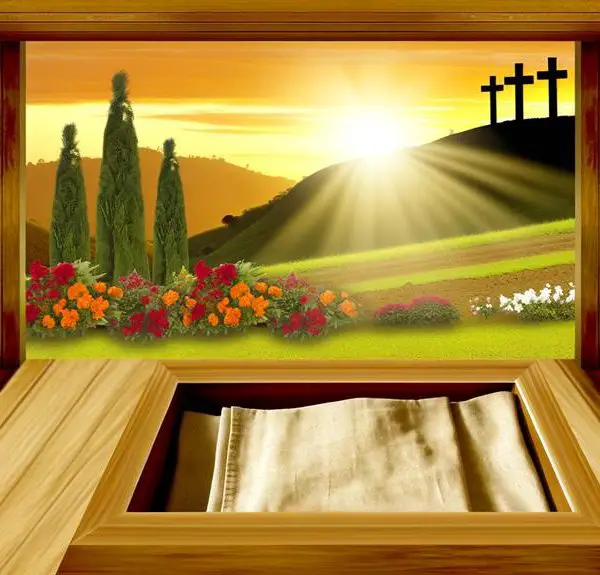
Sign up